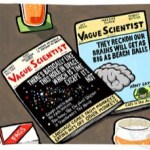Science
Having spent the last couple of posts talking (in part) about the need to change academic culture, and de-stigmatize non-academic science jobs, here's an attempt to step up and do something direct and productive. No, this won't cost you anything.
One of the difficulties with trying to broaden the usual definition of scientists is that there's not a lot of press for non-academic science. Academic culture is so strongly focused on academic careers that people don't hear a lot about careers outside the usual Ph.D-postdoc-tenure-track-job track. Which helps feed the stress and angst regarding the…
This isn't actually about a literal or metaphorical smackdown-- it's more about a distinction in language, related to a number of the comments that have been made regarding Unscientific America. (Yeah, I know. I'll find something else to talk about soon.)
The issue is most clearly laid out by Janet, who writes:
In addition to the research, the grant writing, the manuscript drafting, the student training, the classroom teaching, the paper and grant refereeing, and the always rewarding committee work, academic scientists should be working hard to communicate with the public, to generate their…
The most unfortunate thing about the furor over Unscientific America is that the vast majority of the shouting concerns a relatively small portion of the actual argument of the book. Far too much attention is being spent on the question of whether Chris and Sheril are fair to Myers and Dawkins, and not nearly enough is spent on the (to my mind more important) sections about political and media culture. Which is a shame, because unlike most bloggers, they make some fairly concrete suggestions about what ought to be done to address the problems they describe.
In particular, they make a fairly…
I must thank the reader known to me only as CAC for sending me DVDs of the Inside Nature's Giants programs. I've been enjoying the dissections of an elephant and a whale in the evening — most of the organisms I cut into are millimeters long and require very sharp, thin instruments, so it's interesting to see ones that require hip waders and backhoes.
You should all lobby your local PBS stations and tell them these would be wonderful additions to the lineup! You might also suggest that broadcasting them during the dinner hour might not be recommended.
"Vague Scientist," by the clever/hilarious Stephen Collins of coelecanth diaries
via lots of places (New Scientist, Wired, etc.)
No, not really — my title is a bit of a sensationalistic exploitation of the thesis of a paper by Peterson, Dietrich, and McPeek, but I can buy into their idea that microRNAs (miRNAs) may have contributed to the pattern of metazoan phylogenies we see now. It's actually a thought-provoking concept, especially to someone who favors the evo-devo view of animal evolution. And actually, the question it answers is why we haven't had thousands of Cambrian explosions.
In case you haven't been keeping up, miRNAs are a hot topic in molecular genetics: they are short (21-23 nucleotides) pieces of…
Microsoft Research's Project Tuva website is up. Project Tuva is a collection of seven searchable Feynman lectures aimed at a popular audience (with extras coming online in the future.) The rights to these lectures were obtained by Bill Gates after he was entranced by them over twenty years ago. Well worth watching, especially if you're about to give a popular science talk (I've always been fascinated by how Feynman uses his hands in describing physics.)
Even more interesting, in my egocentric universe, are the comments by Mr. Gates himself about Feynman:
Someone who can make science…
Wow. Here's another inexcusable case of bad science journalism - one that clearly has political motives. This is the lede from a story by Amanda Carpenter in this morning's Washington Times:
President Obama's top science adviser has toyed with extreme measures of population control, even suggesting in one book how to make it more publicly acceptable for the government to spike drinking water in order to sterilize people.
Wow! That would be quite a shocker - if it were true.
Honestly, this "news" article goes off the rails so hard in its first paragraph, I barely know where to start! First…
Yesterday's Michelson Interferometer quiz was surprisingly popular-- as of 8:30 pm Tuesday (when I'm writing this), just under 1500 people have voted in the poll, three and a half times as many as in the next most popular poll I've done. Who says there's no audience for physics?
So, what's the right answer, you ask?
The correct answer finished a distant second (as of 8:30 it has 21% of the votes, to 52% for the leading wrong answer). The answer is that the light goes back where it came from. Bob Hawkins and MattXIV have the right explanation: on the return trip, half of each beam goes to the…
Inspired by one of yesterday's easy questions, a pop quiz for you. The figure below shows a Michelson Interferometer:
A laser falls on a beamsplitter, which allows half of the light to pass straight through, and reflects the other half downward. Each of those beams then hits a mirror that reflects it directly back where it come from. The beams are recombined at the beamsplitter, and then fall on the viewing screen at the top of the figure.
When we add together the light from the two paths, we find that if the lengths of the two arms (that is, the distance from beamsplitter to mirror) are…
It's happening again. The Republicans are tilting at one of their favorite windmills, the mad scientists' dream of creating an unholy union between beast and human to produce a slave race of soulless monsters. They have introduced legislation to ban human-animal hybrids. And it's even bipartisan! They've got 19 Rethuglicans, like Sam Brownback, the ignoramus from Kansas:
What was once only science fiction is now becoming a reality, and we need to ensure that experimentation and subsequent ramifications do not outpace ethical discussion and societal decisions. History does not look kindly on…
Rerun time is over.
Very early Monday morning, a plane touched down, a car drove along a dark and deserted freeway, and my wife and I found ourselves finally back at home. True, we did have a late night diversion to Denny's because we were starving, but by 2 AM or so we were back home. Time to go to bed. Time to go back to work. No more Las Vegas. No more The Amaz!ng Meeting.
Now what?
I probably should have written this yesterday, or on the plane. It's really amazing how fast impressions become memory and memory morphs and fades. But I was simply too tired. I used to be able to adjust to a…
Well, I'm back.
After my trip to TAM7, I'm back in the real world, jet-lagged and tired. So it may take me a while--hopefully only a little while--to get back to my usual prolific output, and there will be something later today. In the meantime, just let me say I really, really wish I had had this T shirt to wear at TAM7:
Well, actually I wish I had a G-rated version of the shirt to wear. I don't generally wear T shirts with profanity on them.
If such a shirt existed, then all I would need to complete my wardrobe would be this one:
That would be a problem, wouldn't it?
Over at the optimizer's blog, quantum computing's younger clown discusses some pointers for giving funny talks. I can still vividly remember the joke I told in my very first scientific talk. I spent the summer of 1995 in Boston at the Smithsonian Astrophysical Observatory (photo of us interns) working on disproving a theory about the diffuse interstellar absorption bands by calculating various two photon cross sections in H2 and H2+ (which was rather challenging considering I'd only taken one quarter of intro to quantum mechanics at the time!) At the end of the summer all the interns gave…
Greg Laden, trying to toss a line between the "New Atheists" and 'Accommodationists" who are currently squabbling about a dust-up featuring PZ Myers v Chris Mooney & Sheril Kirshenbaum (who apparently rough Myers up a bit in their book Unscientific America), writes:
Now, I just want to make this point: I learned early on (when I was still an altar boy) that where religion and life conflict -- where the religion was not doing a good job at explaining the bits and pieces of life that were not making sense -- it was OK to drop the details of the religion part and chalk it up to mystery.
I'…
I've just returned from Las Vegas after having attended The Amazing Meeting.. Believe it or not, I was even on a panel! While I'm gone, However, my flight was scheduled to arrive very late Sunday night, and I'm still recovering. Consequently, for one more day I'll be reposting some Classic Insolence from the month of July in years past. (After all, if you haven't been following this blog at least a year, it'll be new to you. And if you have I hope you enjoy it again.) This particular post first appeared in July 2007.
I really shouldn't do it.
I really shouldn't go perusing the blog of the…
tags: Birdbooker Report, bird books, animal books, natural history books, ecology books
"How does one distinguish a truly civilized nation from an aggregation of
barbarians? That is easy. A civilized country produces much good bird
literature."
~ Edgar Kincaid
The Birdbooker Report is a special weekly report of a wide variety of science, nature and behavior books that currently are, or soon will be available for purchase. This report is written by one of my Seattle birding pals and book collector, Ian "Birdbooker" Paulsen, and is edited by me and published here for your information and…
Science and religion bicker in the backseat. Collin Purrington / Creative Commons
With Francis Collins' nomination as head of the National Institutes of Health I felt it was appropriate to bring up Sam Harris' letter to the journal Nature objecting to what he called "high-minded squeamishness" on the part of the editors for their praise of his book The Language of God. In the book Collins states:
As believers, you are right to hold fast to the concept of God as Creator; you are right to hold fast to the truths of the Bible; you are right to hold fast to the conclusion that science offers no…
Wow: it looks like PZ Myers and his fans are embroiled in a bit of a kerfuffle with Chris Mooney and Sheril Kirshenbaum and their adherents over the new Mooney/Kirshenbaum book, Unscientific America.
First, PZ says the book is "useless." Chris says well, phooey, because plenty of other people like it. And then everybody calls one another "poopyheads" (or variants thereof) in the comments sections of both blogs, which are running into the hundreds.
I'm relieved to note that I am completing two big projects next week, so I won't have time to read my copy of Unscientific America for a couple…
Just in time to feed into the discussion surrounding Unscientific America, there's a new Pew Research Poll about public attitudes toward science. As is usually the case with social-science data, there's something in here to bolster every opinion.
The most striking of the summary findings, to me, is the second table down, in which the fraction of people saying that "Science/ medicine/ technology" is the greatest achievement of the last 50 years has dropped from 47% to 27% since 1999. About half of that shifted to "Civil rights/ equal rights," which is hard to begrudge, but the other half seems…

